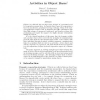Free Online Productivity Tools
i2Speak
i2Symbol
i2OCR
iTex2Img
iWeb2Print
iWeb2Shot
i2Type
iPdf2Split
iPdf2Merge
i2Bopomofo
i2Arabic
i2Style
i2Image
i2PDF
iLatex2Rtf
Sci2ools
145
click to vote
RULES
1993
Springer
1993
Springer
Activities in Object Bases
Objects are collected into an object base because of a presumed need for cooperation among them. In classical object bases the cooperation is based on synchronous, preplanned message exchange. Many of the modern application scenarios such as industrial and oce automation with their high volume of concurrent, interleaved, and iterative actions defy preplanning and require the support of a highly dynamic relationships among the objects. It is the central hypothesis of this paper that the dynamics within such an object base is best covered by the metaphor of communications protocol taken from the telecommunications world. Active objects with their individual threads-of-control establish temporary communication links via a medium which we refer to as activities. Active objects and activity cooperate via a protocol. The main bene
t of such an approach is a clear separation of object-local and cooperative aspects of a common task. The paper augments an existing strongly-typed object-orient...
Related Content
| Added | 10 Aug 2010 |
| Updated | 10 Aug 2010 |
| Type | Conference |
| Year | 1993 |
| Where | RULES |
| Authors | Peter C. Lockemann, Hans-Dirk Walter |
Comments (0)

